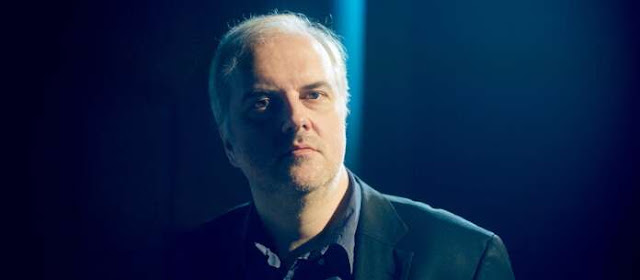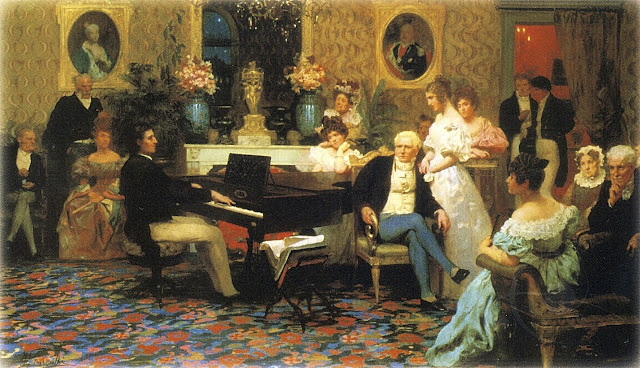Nicolas Angelich (14 December 1970 - 18 April 2022) - Such a great artistic, musical and pianistic loss .....
 |
Nicolas Angelich (14 December 1970 - 18 April 2022) (Photo: Jean-Baptiste Millot) |
Such a pitch black third week of April 2022 as the grim reaper gathered on the dark banks of the Styx the great musical artists Radu Lupu, Nicolas Angelich and Harrison Birtwistle.
I can only offer my review of Angelich playing Brahms as part of the Chopin i jego Europa Festival (Chopin and his Europe) 2012.
25 August 2012 - Warsaw Philharmonic Concert Hall - 19.00
Brahms Piano Concerto No.1 in D minor Op. 15
Nicholas Angelich (piano)
Sinfonia Varsovia - Jacek Kaspszyk
What an embarrassment of Brahmsian riches - two of the greatest piano concertos ever written on the same evening performed by exceptional pianists.
 |
Brahms' 'unsurpassable' view from his composition study window at the Brahms House at Lichtental in Baden Baden |
I was only familiar with the American pianist Nicholas Angelich from his magnificent recording of the Brahms B flat major concerto with Paavo Jarvi conducting the Frankfurt Radio Symphony Orchestra (Virgin Classics) - to my mind one of the greatest recordings of this concerto. Angelich has a particular and singular affinity with Brahms (a most unusual quality in a modern pianist). His recordings of Brahms chamber works - the Trios - have won many awards and been universally praised in the highest terms. I was desperately anxious to hear what he would make of the D minor, one of the towering compositions in the piano and symphonic literature. I was not to be disappointed.
From the outset it was clear he would be faithful to the text (soloists entry marked piano - seldom observed) and had studied and unravelled the monumental architecture of this work. It also became clear that it was to be a true and personal 'interpretation' rather than a bland, 'correct' virtuosic 'presentation' of the work. Yes, it was at once full of the pianist's personality yet faithful to the composer.
The opening Maestoso movement was truly that in tempo, an exalted argument expressed with great noblesse and grandeur, fully capturing the deep vein of Germanic seriousness and profundity, the metaphysical dimension beyond the veil. He allowed the music to breathe treating each note and phrase as if it were a living being, the tonal and harmonic weight of individual notes within those huge chords calculated superbly. The tempo was not rushed which gave our ears time to hear the drama and the heart to beat, to react in sympathy with the music as it unfolded. A rare experience in today's image-obsessed, sensationalist society of too many young pianists.
The Adagio was truly profound with marvellous control of tone colour, ardent tempo, nuance and dynamic. The emotional weight and spiritual considerations spoke directly to the soul here - the tempo causing the emotional inclinations to unfold slowly like a flower. I felt someway into this immense movement he was teetering on the cusp of being too slow (as I am sure many accustomed to the 'standard version' would feel). But then I would hear another heartfelt progression, delicacy of tone, pianissimo dynamic and.....be utterly convinced of the rightness. The sheer selfless lyricism of his reading was certainly an unaccustomed experience. Most pianists do not allow Brahms to meditate in this work and search predominently for the magnificent forward-driving energy that surrounds the heart of the work, this Adagio movement. I would rather they explore the psychological and soulful reflections within it.
I felt the orchestra had difficulty with this interpretation under Jacek Kaspszyk. His conducting revels in the broad strokes and launching exuberantly into the huge tunes and dances rather than reveal the subtleties and nobility in the score that Angelich was endeavouring to elucidate. I fancied I could feel a tension between them but it was not sufficient to unhinge the performance, the pianist's dominance of yet integration with the orchestra.
Angelich continued to communicate his own intense emotional involvement with this work in the Rondo. Allegro ma non troppo. You know the phrase 'ma non troppo' is such a personal decision and again by adopting a less than frenetic virtuosic tempo I felt he allowed the music a structural openness and developing excitement so rare today despite all the emphasis on structure per se. I could actually hear, had been given the time to absorb what Brahms was achieving harmonically. The pianist allowed himself room to move dynamically which gave the work a finely shadowed and chiaroscuro palette of colour.
Angelich was clearly emotionally wrung out at the end of this performance (as was Brahms after he dreamed he was playing this concerto during its gestation 'I was absolutely shattered' he wrote to Clara Schumann). Angelich managed to erect an immense musical cathedral for us. The work makes huge physical and psychological demands on a pianist as committed as he is to being a medium through which Brahms expresses his spirit, as he conceives of it.
For me his reading will add to that small group of truly memorable musical experiences of my life. Others may not agree. Perhaps I was in a particularly receptive mood that night.
I was one of the very few to give him (and of course the Sinfonia Varsovia and Jacek Kaspszyk) a standing ovation and many 'Bravos'. Rare for me.
* * * * * * * * * *
On Monday May 2nd at 19.00 CET on Polish National Radio 2 (Dwojka) you can hear a fine programme online featuring Nicholas Angelich
19:00 Philharmonic of Two
Information about the program led by Róża Światczyńska
In memoriam Nicholas Angelich (1970-2022)
Concert of Nicholas Angelich and the NDR Orchestra in Hanover, conducted by Andrew Manze (07/05/2015, Hanover)
Johannes Brahms Piano Concerto No. 2 in B flat major , Op. 83
Recital of Nicholas Angelich in Vilabertran (18/08/2019, Vilabertran )
Ludwig van Beethoven Sonata in A flat major , Op. 26
Johann Sebastian Bach ed. F. Busoni Wachet auf BWV 645
Johannes Brahms Variations and Fugue on a Theme by Handel op. 24
* * * * * * * * *







Comments
Post a Comment